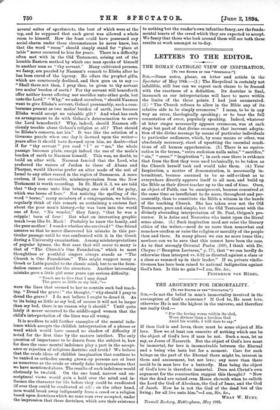LETTERS TO THE EDITOR.
THE ROMAN CATHOLIC VIEW OF INSPIRATION.
[To ms EDITOR OF THE "SPECTATOR."]
SIn,—Some notes, please, on letter and article in the- Spectator of May 19th :—(1.) The Encyclical is certainly not infallible, still less can we expect each clause to be framed with the exactness of a definition. Its doctrine is final,. inasmuch as our interpretations will have to move within the limits of the three points I had just enumerated. (2.) "The Church refuses to allow in the Bible any of its relative side to be simply erroneous." I mean, to be in any way an error, theologically speaking ; or to bear the full connotation of error, popularly speaking. Indeed, whatever at later stages necessarily appears erroneous, was at each stage but part of that divine economy, that inerrant adapta- tion of the divine message by means of particular individuals to particular audiences, which, by some means or other, was absolutely necessary, short of upsetting the essential condi- tions of all human apprehension. (3.) There is no equivo- cation in the terms, "extra ecclesiam nulla salus," "sacrifice," "sin," "error," "inspiration"; in each case there is evidence that from the first they were used technically, to be taken as- the Church herself took and would take them. (4.) Your Inspiration, a matter of demonstration, is necessarily in- termittent, because assumed to be so self-evident as to everywhere directly approve itself to all men, and build up the Bible as their direct teacher up to the end of time. Ours, an object of Faith, can be omnipresent, because conceived at the same time as insufficient to do more, throughout and per- manently, than to constitute the Bible a witness in the hands- of the teaching Church. She has taken over not the Old Testament, pure and simple, but the Old Testament with the- divinely abounding interpretation of St. Paul, Origen's pre- cursor. It is Arius and Nestorins who insist upon the literal sense alone. (5.) Such inspiration need not raise the literary ethics of the writer,—need do no more than somewhat and, somehow confirm or raise the religion or morality of the people- then and there. In many places we can no more trace this; nowhere can we be sure that this cannot have been the case. As to that strongly Oriental Psalm (109), I think with Dr. Cheyne Bampton Lectures," p. 77), that "we can hardly do otherwise than interpret vv. 6-14 as directed against a class or a class as summed up in their leader." If so, private vindic- tiveness has here been raised to national indignation against God's foes. Is this no gain P—I am, Sir, &c., FRIEDRICH VON HilGEL.






































 Previous page
Previous page